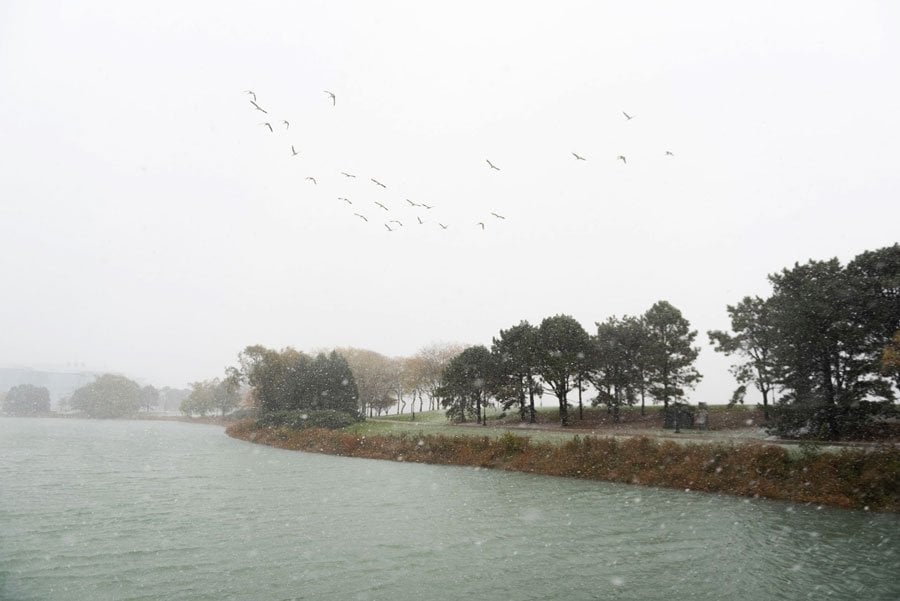CARP struggles to gain traction three years after its implementation
Daily file photo by Evan Robinson-Johnson
The Lakefill. Several environmental advocates in the community said that the city is not on track to reach its Climate Action Resilience Plan goals due to a lack of funding and resources.
February 28, 2022
When City Council first approved the Climate Action and Resilience Plan in 2018, it was poised to advance progressive environmental policy in Evanston.
CARP outlines several climate goals for the city, including 100% renewable electricity for all properties by 2030 and carbon neutrality by 2050. More than three years after it was passed, the city has struggled to take action on the proposal.
Several environmental advocates in the community said that a lack of funding and resources is at the heart of the issue.
“Evanston wants to be progressive on environmental issues, and certainly wants to appear progressive on environmental issues, but is not interested in funding being progressive on environmental issues,” said Cherie LeBlanc Fisher, co-chair of Evanston’s Environment Board.
Sustainability and Resilience Coordinator Cara Pratt said it is difficult to begin new projects without stable financial support.
Some climate activists and policymakers encouraged city leadership to provide more specific guidelines for achieving CARP’s goals. Ald. Jonathan Nieuwsma (4th) said CARP does not include a timeline and procedure for its goals.
“The CARP doc in and of itself is fairly comprehensive in terms of what it intends to do. It’s not a detailed roadmap on how to get there,” Nieuwsma said.
For several years, personnel turnover has prohibited the city from conducting an annual greenhouse gas inventory and other actions, making it difficult to track CARP progress, Nieuwsma said.
Former Chief Sustainability and Resilience Officer Kumar Jensen, a key participant in CARP’s formulation, left the position in August 2021. Former Mayor Steve Hagerty also disbanded the CARP Working Group after the plan’s adoption. LeBlanc Fisher said the current city manager vacancy has also delayed climate action.
Other advocates said the government needs to hold itself more accountable for completing CARP goals. They suggest the city create a public dashboard and keep residents informed about the process.
Lily Aaron, an Evanston Township High School student serving on the Citizens’ Greener Evanston board, said she’s upset that the city has not informed residents about CARP progress. She said the city should implement a dashboard or better utilize the Environment Board’s CARP Implementation Task Force.
“The majority of Evanston residents don’t even know what CARP is,” said Aaron, who is also a hub coordinator for youth climate advocacy group Etown Sunrise.
Jerri Garl, chair of the CARP Implementation Task Force and former member of the CARP Working Group, said civilians might not notice many potential future measures like LED light installations and building electrification. She said the city needs to inform and solicit feedback about the plan from Evanston residents.
“We have not done a great job with public awareness, education, just communication (on climate action and resilience),” Garl said.
Although Evanston has not yet launched any major CARP initiatives, proponents of the plan said the city has made some progress. Evanston launched a Community Solar energy program and hired a solid waste coordinator in 2021. Last month, Tesla also installed 12 new Supercharger stations in the Maple Avenue parking garage.
Ald. Eleanor Revelle (7th) said the city is working on smaller projects like promoting sustainable transportation, considering new bike paths and sidewalk improvement programs.
Joel Freeman, board member of Citizens’ Greener Evanston and former co-chair of the CARP working group, said several proposals submitted to the city government, like the renovation of the heating and ventilation systems at Noyes Cultural Arts Center, include the plan and will advance Evanston climate policy.
“It’s no longer an afterthought that has to be imposed from the outside,” Freeman said. “It’s now being incorporated as a way of doing things.”
Environment Board members have also discussed rewriting Evanston’s building code to align with CARP, which aims to reduce building energy consumption by 35% by 2035. Pratt said buildings are responsible for 80% of the city’s carbon footprint.
Mayor Daniel Biss announced in January that Evanston would join other cities in President Joe Biden’s National Building Performance Standards Coalition, which aims to “inclusively design and implement equitable building performance standards.”
City Council is also thinking about allocating funds from the American Rescue Plan Act toward retrofitting old buildings in low-income neighborhoods, improving their energy efficiency, Revelle said.
“We’ve got all these great buildings that were built a long time ago and aren’t very energy-efficient,” Revelle said. “It’s going to be a very long process.”
Revelle said City Council should require commercial buildings to host recycling and composting receptacles and further incorporate CARP goals into the city’s Strategic Plan.
This initiative would help Evanston catch up in an area in which it is “way behind,” Revelle said.
“Our (waste) diversion rate,” she said, “is pathetic.”
Some advocates noted that the city may need to revise CARP’s goals to reflect more recent research. Pratt said it would be logical for the city to re-evaluate CARP’s benchmarks in 2023 — five years after it was passed.
Aaron, who attended the U.N. Climate Change Conference in November 2021, said the CARP goals are no longer sufficient since the city did not act quickly enough from the start. Still, she said the plan is a basis for action and that Evanston cannot continue to act like a leader in climate policy without enacting change.
“We can’t continue to front like we are a step ahead of other suburbs,” Aaron said. “We are simply all talk. We have this plan, and (we’ve) done nothing with it.”
Email: [email protected]
Twitter: @rjleung7
Related Stories:
— D65 parent climate action team advocates for institutional climate change strategies
— CARP Implementation Task Force talks environmental justice, ARPA funding












